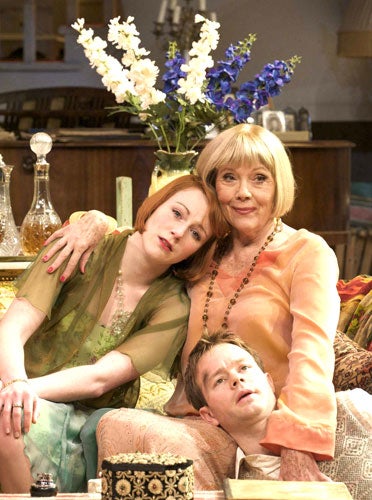First Night: Hay Fever, Chichester Festival Theatre
Less is more in the Coward school of humiliation

Noel Coward admitted that Hay Fever (1925), one of his earliest successes, had no plot and remarkably little action. Four guests visit a bohemian family for the weekend by the river in Cookham and depart, distraught and discombobulated, straight after breakfast on Sunday.
So any production depends for its success on the technique of the actors – and Nikolai Foster's revival at Chichester, presumably West End bound, is a mixed blessing. There has not been a wholly successful version of this play since the National's rediscovery of it in 1964 and even that was partly handicapped by a befuddled Edith Evans as the self-dramatising actress Judith Bliss. Judith is ageing, not senile. Diana Rigg is much better, plausibly attractive and poised on the cusp of retirement. Her guest of choice is the slightly dim, athletic Sandy Tyrell, whom Edward Bennett – acclaimed as the RSC's Hamlet stand-in for David Tennant – plays as a puppyish, amenable upper-class twit straight out of PG Wodehouse.
Judith is married to a novelist, David (Simon Williams), whose own guest is Natalie Walter's bemused flapper, Jackie Coryton. The Bliss children, Simon and Sorel – bickeringly at odds in the well-delineated performances of Sam Alexander and Laura Rogers – have invited, respectively, a notorious vamp and a famously discreet diplomatist.
The vamp, Myra Arundel, played by Caroline Langrishe, "goes about using sex as a sort of shrimping net", according to Judith. Guy Henry's diplomatist, Richard Greatham, is sucked into the after-dinner charades like a good sport but gets it all wrong: instead of lighting someone's cigarette "in the manner of the word" winsomely, he mistakenly picks up on the word "saucily" and advances across the stage like a deranged chimpanzee, clutching at invisible buttocks and blowing out his cheeks.
This indicates the extent to which Nikolai Foster's production moves the action towards farcical brush strokes. When Henry knocks the barometer, he catches his groin on a walking stick before trying to hide the instrument in his jacket. He starts performing like Brian Rix, not a diplomat, forgetful that he should be wrecked by the night he's spent in a stuffy bedroom by the pipes and boilers. Similarly, Bennett executes one too many pratfalls when plagued with hiccups, having already tripped over the luggage in the first act.
It's still a fresh and funny process of humiliation, but Foster tries turning it into "art" by staging a silent tableau between acts two and three while the setting is changed; better to have taken the second interval. And Robert Jones's design contains the terrible social howler of having the French windows double as the front door; is the doorbell in the garden?
Otherwise, the show looks pretty good. Dame Diana, hair beautifully cut, voice as smoky as a Sobranie cigarette, makes an extravagant point of having pruned the calceolarias, presiding over the charades in fetching mauve trousers and a bejewelled tunic; she even sings that "little French song" at the grand piano. She makes Judith's monstrosity charming, and proves that in playing Coward, less is always more than enough.
Subscribe to Independent Premium to bookmark this article
Want to bookmark your favourite articles and stories to read or reference later? Start your Independent Premium subscription today.

Join our commenting forum
Join thought-provoking conversations, follow other Independent readers and see their replies